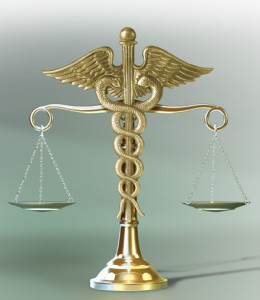Law Upheld – Doctors Can’t Ask Patients About Guns
By Dr. James Palermo // July 31, 2014
PHYSICIANS TO APPEAL 'DOCS VS. GLOCKS LAW'
ABOVE VIDEO: ABC Action News reports on federal appeals court upholding “Docs vs Glocks” law banning doctors from asking patients and families about gun ownership.
BREVARD COUNTY • MERRITT ISLAND, FLORIDA — A Florida law prohibiting doctors from talking with patients about gun safety was upheld on Friday by a three-judge panel in the 11th Circuit Court of Appeals, but an injunction blocking the law remains in effect.
 The 2-1 ruling overturns a June 2012 U.S. District Court ruling that struck down the state law – popularly referred to as the “physician gag law” or the “Docs v. Glocks law”—as a violation of physicians’ First Amendment rights.
The 2-1 ruling overturns a June 2012 U.S. District Court ruling that struck down the state law – popularly referred to as the “physician gag law” or the “Docs v. Glocks law”—as a violation of physicians’ First Amendment rights.
Doctors and gun-control advocates subsequently announced that they will appeal to the full 11th U.S. Circuit Court of Appeals in an attempt to again overturn the controversial law.
PHYSICIANS: LAW INTRUSION INTO DOCTOR-PATIENT RELATIONSHIP AND VIOLATION OF 1ST AMENDMENT
Merritt Island pediatrician and past president of the Florida Pediatric Society (the Florida chapter of the American Academy of Pediatrics [AAP]), Dr. Lisa Cosgrove wrote in an August 2011 Space Coast Medicine & Active Living magazine op-ed, “Ultimately, the bill will infringe on the patient-physician relationship, increase government intrusion in the practice of medicine, and decrease the safety and health care of Florida’s children.
The bill is an unnecessary intrusion into the physician-patient relationship as privacy regarding patient visits is currently covered under national law through the Health Insurance Portability and Accountability Act. Because of the existence of HIPAA, no law is needed.”

Dr. Cosgrove goes on to say,“During a visit, several aspects of the home are discussed, including swimming pools, hazardous chemicals, smoke detectors, medications, and firearms. Answers to these questions help parents protect their child from multiple forms of harm.”
Mobeen Rathore, MD, president of the Florida chapter of the American Academy of Pediatrics, the Florida Pediatric Society, and a lead plaintiff in the suit, said in a prepared release, “We strongly disagree with the 11th Circuit’s decision. It is an egregious violation of the First Amendment rights of pediatricians and threatens our ability to provide our patients and their families with scientific, unbiased information.
“This dangerous decision gives state legislatures free license to restrict physicians from asking important questions about health and safety that are vital to providing the best medical care to patients.”
PROPONENTS OF THE LAW: NECESSARY TO PROTECT GUN-OWNER PRIVACY RIGHTS
The gun lobby had pressed the Florida Legislature to pass the 2011 law, with supporters of the 2011 law, which was backed by the National Rifle Association, claiming that physicians might turn away patients who own guns or who don’t answer questions about gun ownership.

The NRA said in a media release that the law is needed to protect gun owners’ privacy rights “from Florida chapters of the American Academies of Pediatrics and American College of Physicians, along with a number of other groups and individuals backed by the anti-gun community…”
NRA lead lobbyist Chris Cox said, “Every gun owner in Florida and across the country is grateful for this common sense ruling. It is not a physician’s business whether his or her patient chooses to exercise their fundamental, individual right to own a firearm.”
ACLU: ‘UNCONSTITUTIONAL’ LAW GAGS DOCTORS
Howard Simon, executive director of the American Civil Liberties Union of Florida, which filed a friend of the court brief on behalf of the physicians, said in a prepared release, “It’s a sad day when judges tell doctors what is in the best interest of their patients…This unconstitutional law gags doctors and prevents them from talking to their patients about measures to help parents protect children from guns in the home. The only thing that makes this discussion ‘bad medical practice’ in the view of two federal judges is the fact that it has to do with guns.”
STRONG DISSENTING OPINIONS SET UP SHOWDOWN IN FULL APPEALS COURT
Writing for the majority, 11th Circuit Court Judge Gerald Bard Tjoflat, appointed to the court by President Nixon, said the law takes into account a patient’s “relative powerlessness” in a physician’s examining room, and “simply acknowledges that the practice of good medicine does not require interrogation about irrelevant, private matters.”
“As such, we find that the Act is a legitimate regulation of professional conduct. The Act simply codifies that good medical care does not require inquiry or recordkeeping regarding firearms when unnecessary to a patient’s care,” Tjoflat wrote. “Any burden the Act places on physician speech is thus entirely incidental.”

The lone dissenter on the 3-judge panel, Judge Charles R. Wilson, who was appointed to the court by President Clinton, said gun violence is a serious public health issue and that the Florida law “significantly infringes” upon a physician’s valid reasons to raise gun safety concerns with patients.
“Simply put, the Act is a gag order that prevents doctors from even asking the first question in a conversation about firearms,” Wilson wrote.
“The Act prohibits or significantly chills doctors from expressing their views and providing information to patients about one topic and one topic only, firearms.””Regardless of whether we agree with the message conveyed by doctors to patients about firearms, I think it is perfectly clear that doctors have a First Amendment right to convey that message.”
This is not a black or white issue. Both camps make very legitimate arguments and, although opponents of the law seem very confident that they will prevail on appeal, it’s anybody’s guess what will happen when the case is reheard by the full appeals court.












